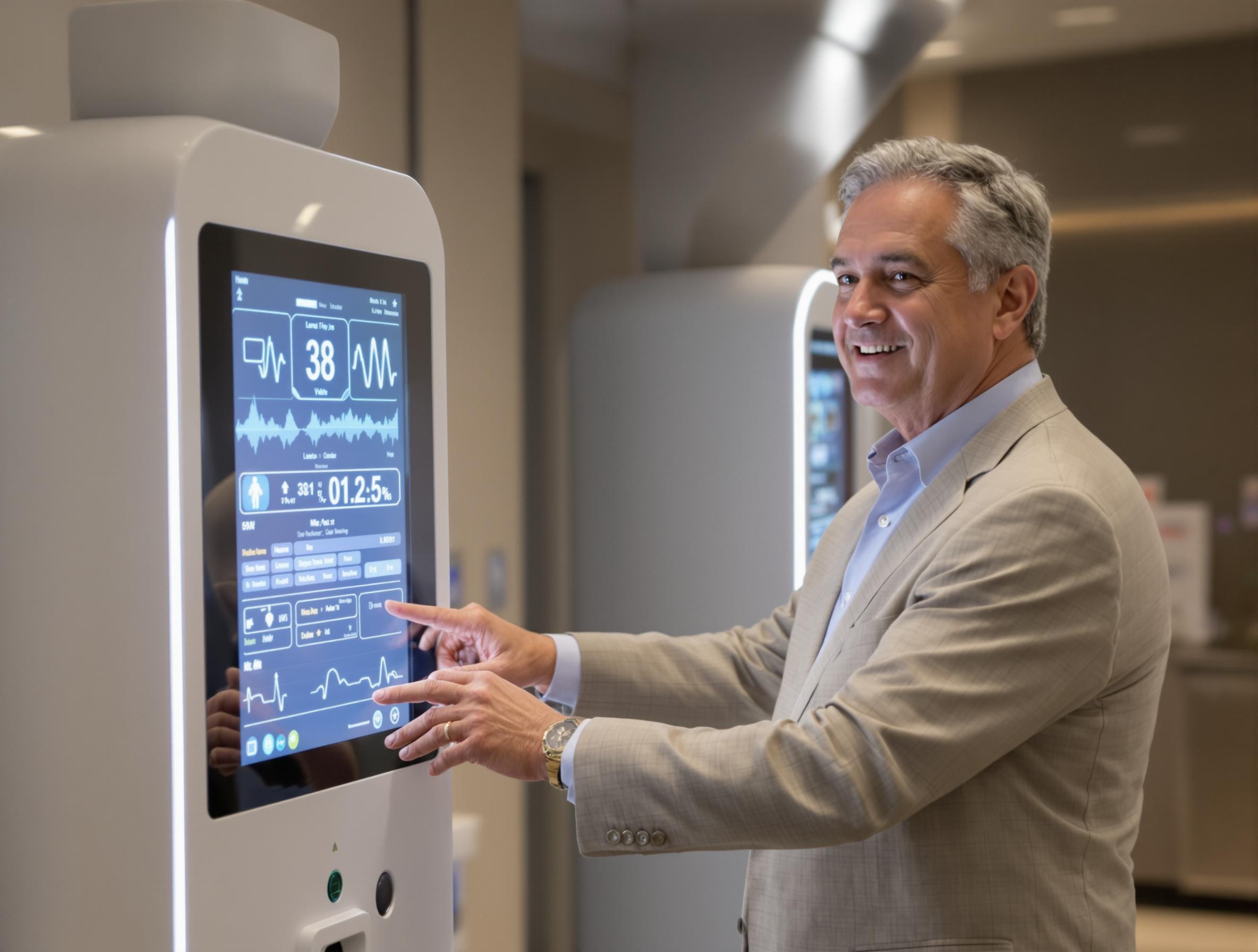The Benefits of a Personalized Healthcare

For years, healthcare was pretty much a “one-size-fits-all” deal. But with all the amazing advances in tech and medical research, we’re shifting toward something more personalized. Personalized healthcare considers what makes you—your genetic makeup, lifestyle, and unique health needs. The goal? Tailoring treatment plans to fit you perfectly so you get the best possible care and better results.
Mobile Care Health is at the forefront of this shift, offering holistic and highly individualized healthcare solutions. Our expert team works closely with patients to craft comprehensive care plans, ensuring they receive the most effective treatments and proactive interventions tailored specifically to their medical history, lifestyle, and personal health goals.
What is personalized healthcare, and how does it work?
Personalized healthcare, or precision medicine, is an approach to medical treatment and healthcare that tailors decisions and treatments to individual patients based on their unique genetic, environmental, and lifestyle factors. Unlike the traditional “one-size-fits-all” approach, personalized healthcare seeks to provide the most effective treatment or prevention strategies for each person based on their specific characteristics.
Here’s how it works:
- Genetic information: By analyzing a person’s genetic makeup (through DNA sequencing or genetic tests), healthcare providers can understand how a person’s body might respond to certain drugs or treatments. For example, some individuals may metabolize medications differently based on their genetic profile, making certain treatments more effective or reducing side effects.
- Environmental factors: Personalized healthcare also considers environmental influences, such as where a person lives, their occupation, exposure to toxins, or even the climate they’re in. These factors can contribute to the likelihood of developing specific health conditions or influence the effectiveness of treatments.
- Lifestyle factors: An individual’s lifestyle, including diet, physical activity, sleep patterns, and smoking or alcohol use, also plays a significant role in health outcomes. Personalized healthcare considers these factors to suggest preventative measures, interventions, or treatments suited to that person’s unique situation.
- Data integration and artificial intelligence: Electronic health records, wearable devices, and data analytics help doctors access and interpret large amounts of personal health data. AI and machine learning algorithms can identify patterns and recommend the most effective treatments based on the individual’s data.
Personalized healthcare vs. traditional healthcare
Personalized healthcare and traditional healthcare differ in their approaches to treatment. Personalized healthcare focuses on tailoring medical care to the individual, while traditional healthcare typically follows a more generalized, one-size-fits-all model.
Here’s a comparison of both:
|
Feature |
Personalized Healthcare |
Traditional Healthcare |
|
Approach |
Tailored to individual needs: Treatment and care plans are customized based on the individual’s genetics, lifestyle, environment, and medical history. |
One-size-fits-all model: Treatments and protocols are generally based on standardized methods for the population without considering personal differences. |
|
Data Utilization |
Uses genetics, lifestyle, and medical history: Personalized healthcare extensively uses genetic tests, lifestyle information, and personal medical history to inform decisions. |
Generalized data application: Relies on generalized data such as age, gender, and typical disease patterns to inform treatments without much consideration for individual differences. |
|
Treatment Customization |
Precision medicine and proactive care: Treatment is customized based on the patient’s unique characteristics. It also focuses on proactive care, identifying potential issues before they develop into serious conditions. |
Reactive treatment strategies: Treatments are usually provided after the onset of a condition, often addressing the symptoms without much focus on prevention or personal factors. |
|
Patient Involvement |
Encourages shared decision-making: Patients are actively involved in their treatment decisions, contributing insights about their lifestyle, preferences, and health goals, leading to more collaborative care. |
Limited patient input: While patients may express concerns or preferences, treatment decisions are generally made by the healthcare provider with less emphasis on patient involvement in planning. |
|
Cost Efficiency |
Reduces long-term healthcare costs by preventing diseases: Personalized healthcare aims to reduce future healthcare costs by focusing on early diagnosis, prevention, and more effective treatments tailored to the individual. |
May lead to higher costs due to repeated treatments: Traditional healthcare may result in higher long-term costs, as it often involves trial-and-error approaches, repeated treatments, and more hospital visits. |
Benefits of personalized healthcare
Personalized healthcare offers many advantages, making it a superior choice for patients and healthcare providers.
- Better disease management: Tailored treatment plans improve the management of chronic diseases, ensuring that patients receive optimal care based on their individual needs rather than generalized protocols.
- Optimized treatments: Personalized medicine enhances treatment effectiveness by reducing trial-and-error prescribing. This minimizes side effects and improves patient response rates.
- Enhanced patient-provider relationship: The collaborative nature of personalized healthcare fosters stronger relationships between patients and their healthcare providers, leading to increased trust and better communication.
- Improved mental and physical well-being: A holistic approach considers all aspects of health—mental, emotional, and physical—creating a more comprehensive and effective healthcare experience.
- Higher patient satisfaction: Patients who receive personalized care are more satisfied with their treatments because they align with their unique health goals, preferences, and values.
- Preventive care and early detection: Advanced screening techniques and genetic profiling allow for the early detection of potential health risks, enabling timely interventions that prevent severe health issues.
Overcoming challenges in personalized healthcare
While personalized healthcare offers numerous benefits, some challenges hinder its widespread adoption. However, strategic solutions can address these obstacles.
- High costs
- Solution: Integrating cost-effective technologies, insurance coverage for personalized treatments, and government policies supporting precision medicine can help reduce financial barriers.
- Data privacy concerns
- Solution: Strict data encryption protocols, compliance with healthcare data regulations (e.g., HIPAA), and transparent policies on data usage can help protect patient information.
- Limited access to advanced technology
- Solution: Expanding telehealth services, utilizing AI-driven diagnostic tools, and increasing healthcare provider training in personalized medicine can improve accessibility.
- Patient education and engagement
- Solution: Awareness campaigns, educational programs, and patient-centered discussions can help individuals understand the benefits and implications of personalized healthcare.
Embracing Personalized Healthcare for a Healthier Future with Mobile Care Health
Personalized healthcare is transforming the medical industry by shifting the focus from reactive treatment to proactive, individualized care. By leveraging cutting-edge technologies and fostering patient-centered relationships, this approach enhances health outcomes, improves disease prevention, and increases overall patient satisfaction.
Mobile Care Health is committed to providing innovative, personalized, holistic healthcare services tailored to each patient’s needs. Their expert team uses advanced diagnostic tools and data-driven methodologies to develop customized care plans that promote long-term well-being.
By embracing personalized healthcare, individuals can take control of their health, receive more effective treatments, and prevent diseases before they develop. Explore Mobile Care Health’s personalized healthcare solutions today and experience the transformative benefits of individualized medical care.





